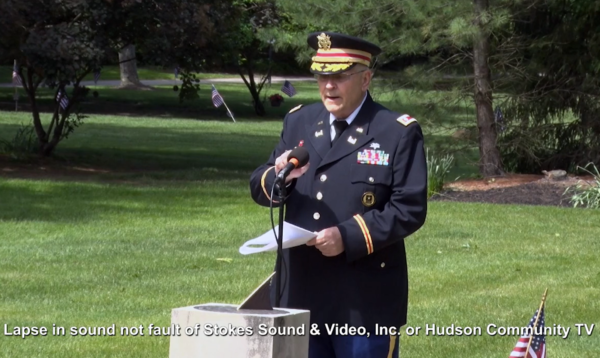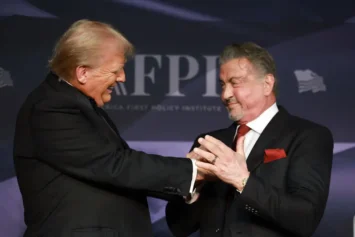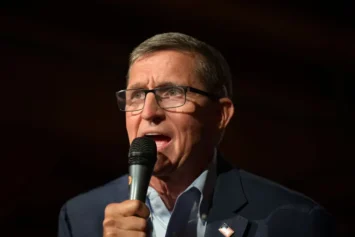The Ohio American Legion is conducting an investigation after an Army veteran’s microphone was turned down when he started to talk about the role of Black Americans in the origins of Memorial Day during a speech on May 31.
When Army Lt. Col. Barnard Kemter spoke about free Blacks honoring deceased soldiers after the Civil War at the Memorial day event at Markillie Cemetery in Hudson, Ohio, his microphone was lowered. One of the organizers of the event has admitted to dropping the audio.

Members of Hudson American Legion did not want the portion of Kemter’s speech to be included because they felt it wasn’t relevant to their goal of honoring Hudson veterans, said president of the Hudson American Legion Auxiliary Cindy Suchan.
Declining to say who dropped the audio, Suchan told the Akron Beacon Journal Kemter’s remarks were “not relevant to our program for the day.” She added, “We asked him to modify his speech, and he chose not to do that.”
“The Ohio American Legion assures us that they are fully investigating this incident,” The American Legion wrote on Twitter. “Regardless of the investigation’s outcome, the national headquarters is very clear that The American Legion deplores racism and reveres the Constitution.”
Footage of Monday’s event shows Kemter tapping his microphone halfway through the 11-minute speech. While the first national commemoration of Memorial Day has been attributed to a ceremony that took place on May 3, 1868 at Arlington Cemetery, where both Union soldiers and Confederates were buried, Harvard archives of newspaper clippings and handwritten notes revealed that Black Americans also played a crucial role in early Memorial Day traditions.
“Memorial Day was first commemorated by an organized group of Black freed slaves less than a month after the Confederacy surrendered,” Kemter said. While controversy exists regarding the true origins of the holiday, Kemter said Yale historian Daiod White has asserted that Memorial Day traditions first began when freed slaves conducted a ceremony on May 1, 1865.
“The ceremony is believed to have included a parade of as many as 10,000 people, including 3,000 African American school children singing the Union marching song ‘John Brown’s Body,'” Kemter said. Those marching carried flowers to decorate graves of fallen soldiers, he continued.
At that point, Kemter’s microphone was lowered. “We’ll continue on,” he said, tapping the microphone in confusion. Kemter continued to speak about a group of freed slaves who exhumed a mass grave of Union soldiers and provided them each with a “proper burial.”
According to Kemter, it was Black people in the South who “perpetuated the tradition” of Memorial Day in the years to come. When Kemter transitioned from the topic of Black Americans’ role in establishing the holiday, his microphone was turned back up.
Dr. David Blight, Sterling Professor of History, African American Studies & American Studies at Yale University noted that the city of Charleston in South Carolina was in disrepair, due in part to the U.S. Civil War that began in 1861. As a result, white Charlestonians vacated the city premises, while thousands of Blacks, remained in Charleston.
During this time, the Black community joined forces, organizing a variety of memorial events to not only acknowledge fallen soldiers but to proclaim their discernment of the true definition of war.
Kemter spoke to the Akron Beacon Journal about the censorship.
“I find it interesting that [the American Legion] … would take it upon themselves to censor my speech and deny me my First Amendment right to [freedom of] speech,” Kemter said “This is not the same country I fought for.” He also told the Washington Post he initially believed the audio issue was the result of a technical problem.
State Rep. Casey Weinstein, who represents the district that includes Hudson, responded to the incident on Twitter on Wednesday writing, “This is an EMBARRASSMENT. I want to know why the organizers felt they had to censor this veteran at our Hudson Memorial Day event!”


